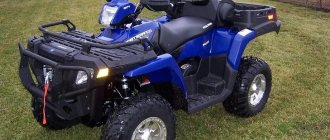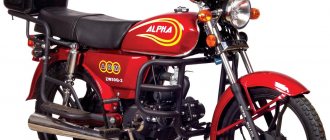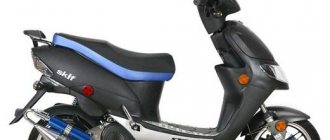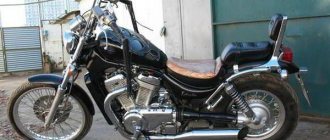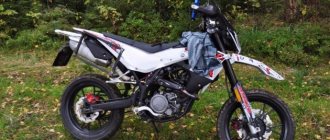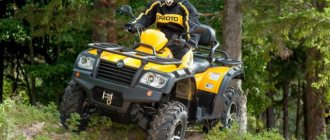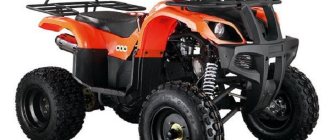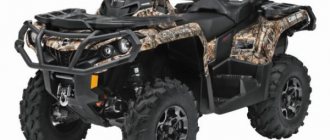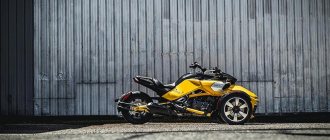On that day when it was summer in the Urals this year, I was very lucky to test a new tricycle from BRP - Cam-Am Ryker, and even in the Rally version - the most powerful engine, prepared for the ground!
Of course, I’m not a sugar freak, and neither cold nor rain scares me, and I’ve ridden long distances on a motorcycle in the snow, but it’s still better to test new equipment in good weather - and take pictures in normal light and you can better understand the nuances of handling and behavior and reveal all the possibilities and realize the power of the engine. So I had no luck with the summer, but quite well with good days.
The controls are also unusual, and unusual for everyone - no matter what kind of equipment you control, I will compare it mainly with a motorcycle. So, the first thing, in American style, is the ignition switch on the left, which essentially doesn’t exist as such - you just have a key fob, you can keep it in your pocket, but I kept it in place near the knee.
Let's start with the fact that the entire tricycle can be adjusted to suit you and the riding conditions - you can adjust the steering wheel both for reach and tilt (quickly only for reach).
The length of the footpegs is very useful, because my legs are quite short and sometimes I want the footpegs to be a little closer, which is what I did - I moved them closer, they move together with the brake machine and, accordingly, the pedal, at the same time I made the landing a little more suitable - legs not so stretched out (this makes it easier to sit in the seat).
On the contrary, the steering wheel was made slightly away from itself - keeping the tilt so that the glass would cut off the wind at the top of the head, and not at eye level (by the way, the glass can also be adjusted in height).
And it’s not easy to adjust, but without tools and in three easy movements! This system is called UFIT, pass!
Next, the brakes are also unusual: there is no lever on the right handle, all control is on the lever under the right foot. Brakes with ABS, with two-piston Nissin on all wheels.
The Rally Edition has a different suspension - in this case, these are KYB shock absorbers at the front, adjustable for preload, while the suspension itself consists of two parallel A-arms, which are covered with aluminum flaps at the bottom in this version. Suspension travel 162 mm.
At the rear, the suspension consists of a cantilever arm, respectively, the wheel is fastened with one lever, and as in motorsport - on one nut and even secured with a beautiful red ring - such little things are very noticeable and they set the mood.
The monoshock absorber is also KYB, it is adjustable both for preload and damping/compression using a thumbwheel in 4 positions - for example, it seemed to me that the suspension was not working quite correctly for my weight, and I tightened it up one click - it got better. Rear suspension travel 175 mm. At the same time, the stroke is increased compared to the regular version. The ground clearance is 112 mm - a little, of course, in our realities, but let's see if it's enough for a ride!
The tires here are also unusual - with a developed checker, they cover the sidewalls of the disc, the profile is quite high, they were developed especially for Ryker by the Kenda company - they promise that the tires will be optimal for this equipment both in terms of grip and wear resistance, which is important, considering orientation of the model. Front dimensions are 145/60R16, rear 205/55R15.
Ryker engine
Well, let's get to the heart - there are two of them on Ryker, both Rotax ACE engines, and both are already known from other BRP equipment - they are used on ATVs and snowmobiles, so there should be no problems with service, reliability, spare parts and consumables. The junior engine is a two-cylinder 600 cc with 47 horsepower, but the Rally Edition has a maximum engine of 900 cc and according to all press releases and websites it produces 77 hp.
But in fact, engines with different firmware are supplied to Russia, and even in the PTS it says 83 hp. - a nice addition! Naturally, the engines are injected, liquid cooled, the radiator is in front and covered with a grille on this version - it won’t be superfluous on primers.
The transmission is also a fairly typical solution for BRP equipment - a continuously variable variator, there is a gearbox, reverse gear, all controlled by a foot lever.
On the left there is a parking mode - parking, this is a checkbox that needs to be switched manually. Nearby is the chip key slot.
But then there’s a new solution - a driveshaft with a CV joint, which runs inside a massive cantilever arm and ends with a gearbox.
It seems to me that the cardan is always more reliable (although it is heavier and hides more power).
Since we're going over the details, we can talk about the fuel tank - it's approximately in the place where you'd expect it, and everything here is classic, but even the hatch opens unusually - with a shift. In terms of volume, 20 liters - there should be a good power reserve, since, for example, I didn’t even spend 10 liters in a day, although I drove a lot and did not hesitate to press the trigger.
Well, we fall onto the seat, which looks quite sharp in outline and seems hard, but in reality it is soft and comfortable, I would say even like a cruiser!
At the back, in this version, there is a tail - you can put, for example, a trunk on it, or a passenger seat with a reclining backrest.
The trunk itself and the passenger seat are all also from the list of special features, and the list of special features is very large - there’s individualization and convenience and protection and.. anything right down to branded equipment!
Having sat down, adjusted the footrests, steering wheel and windshield, we see the following picture - familiar remote controls, and they are familiar, probably to everyone - this is already a standard in the world. There is a fairly large 4.3″ screen, and this is where the interesting things lie - for example, you can customize the driving modes - ECO (who even drives in it?), Standard, and Rally - this is what interests us most of all, as well as the Sport mode. And so, in principle, everything is standard - speed, revolutions, mileage, fuel level, engine temperature, gear engaged. Everything is visible well, does not glare in the sun.
The mirrors are unusual and are in the retro and café racing style fashion - the last time I rode with these was on a Triumph Truxton.
On a motorcycle this is not practical - the mirror fell off, plus the motorcycle widens - it’s inconvenient in traffic, and it’s not very convenient to use grips because you’re not used to it - you hit your palm on the mirror pillars. Here, in principle, you’ll hardly have to fall, and you don’t care about the width - it’s a tricycle!
But as for the fact that you can see in them, it’s an open question - in heavy traffic it’s not the best solution, you have to actively turn your head and look closely, since these mirrors are wider, you have to move your gaze further down than usual, but there is no problem like on many motorcycles and this technique when broad shoulders interfere with visibility.
You can also take a fashionable selfie))
In my case, the list of options also included a small case for a phone and documents on magnets on the tank. Quite a handy thing.
There is also a standard 7-liter case on the front of the “hood” up to the windshield - you can also put something there, the same documents - it is protected from water and splashes by a seal and is quite roomy - some little things, gloves will fit there.
There are also lenses with LED low beams on separate stands - they are turned on by default, there are high beam headlights in the classic place, they are ordinary, halogen.
All this shines quite well, and the equipment is clearly visible on the road; the lights on the front fenders also act as dimensions - in normal mode they are white, when the turn indicators are on, they work like LED turn signals - you will not go unnoticed.
Since we're talking about light, there are double narrow strips of lights at the back, they are also LED and bright.
There are also LED turn signals and reflectors mounted on racks, stickers on the front fenders - all for safety. But there is also a minus - the protruding stands are plastic and they really stick out, and although the lamps themselves are on a soft rubber band and bend, the reflectors on the flimsy metal bracket, which someone had already bent, had to be straightened by hand for the photo, although then I touched it with my foot again and I crooked a little, so this solution has its downsides, but the main thing is visibility and safety!
Technical equipment of Spyder tricycles
BRP roadsters are equipped with a semi-automatic 6-speed SE-6 transmission, providing a smooth ride and instant acceleration. The rear suspension is a pendulum mechanism with a monoshock absorber, and the front is an A-arm with stabilizer bar. Canadian manufacturers paid great attention to safety systems, equipping Spyder models with:
- TCS (traction control system);
- SCS (rollover prevention system);
- ABS (anti-lock braking system);
- DESS (anti-theft system).
BRP roadsters are equipped with perforated ergonomic seats, and also have a UFit system, which allows the driver to choose the most comfortable position, which is important during long journeys. Comfortable travel on Spyder roadsters is also possible thanks to the availability of:
- reliable Brembo brake system;
- color digital display on the dashboard;
- tinted windshield;
- spacious luggage compartments (total volume up to 155 l);
- heated grips on the steering wheel.
Spyder tricycle models will allow every driver to experience the indescribable pleasure of a comfortable ride and excellent dynamic performance. Quench your thirst for speed and unstoppable drive with powerful BRP roadsters.
How does the Can-Am Ryker perform on the road?
Well, why are we all beating around the bush - we admired it, marveled, poked everything, twisted it and that’s enough, it’s time to fight!
To drive, you need a whole ritual: we stick the key into the socket (you can then put it in your pocket), press start - the ignition turns on, the screen comes to life, on which, among other things, something incomprehensible is written, but from this inscription we must understand that the gas handle needs to be unscrewed FROM OURSELVES, after which we press the starter button again - the engine starts with a short roar. Well, in order to go, you need to switch the flag from the parking lot to the driving mode (if you forget, the trike will remind you of this with a nasty squeak) - that’s it, you can go! Ugh...
I’m quietly driving around on the roads of a quiet area, getting used to the controls, but there’s a lot to get used to: weight shift, tilt, taxiing, counter-steering, everything is different. And there’s nothing to compare it with - it doesn’t look like a motorcycle or an ATV. I try the brakes, apply the brakes several times until the ABS activates. I try to sharply open the gas - I wonder how the variator and traction control system will behave in normal mode - slipping is allowed, but short, enough to scare pedestrians or even a little you, but no more. The response to the accelerator is similar to that of ATVs - after all, these roots are here, there is its own specificity of detonation during acceleration. And it is there - a blast, and the traction is easy and convenient to control, there is no excessive sharpness, and there are no obvious delays - it’s very convenient, although for some people the sport and power may not be enough - after all, 83 horses for 285 kg of weight is not so much - not supersport. But I will say that there is always enough dynamics in a traffic situation!
Well, okay, it’s time to roll out to the city center. And then a big plus and minus emerges: I’m used to riding a motorcycle between the rows. For example, I see that the red light is on and in the aisle I roll quietly to the stop line and am the first to leave - it’s so safe, you’re visible to everyone. Only on a cruiser or a larger tourist it’s a bit difficult - the panniers and the width of the steering wheel don’t always allow you to squeeze through. And here it’s one and a half meters wide!! There is no question of any row spacing!
You can console yourself with the fact that standing in a traffic jam is quite comfortable - there is no need to put your feet on the asphalt, hold on to the equipment, you just slow down and that’s it. The heat exchange is also made in such a way that the legs, even in the heat, do not get hot from the hot engine. Another plus is that a tricycle is larger than a motorcycle purely physically - longer and much wider, so they can see it better and hear the exhaust, although it is quiet, it still differs in sound from cars.
Overclocking Ryker
Well, we’ve got out of the traffic jams, you can turn on the lights at the traffic lights - Ryker allows this - and with a short slipping and wobbling of the stern, it goes briskly up to city speeds, then a certain gag occurs related to the operation of the variator, its features, you will have to put up with this, and it’s easy gets a hundred.
We won’t be rude in the city, but you’re still always the first... Moreover, not all motorcycles will be able to overtake you - since not every rider will be able to apply traction accurately, evenly and ensure the correct grip of the rear wheel. Even if they are noticeably better than you in terms of power/weight ratio. On this tricycle it is much easier to dose the gas, the grip is very good - the contact patch is much larger than that of a motorcycle, even despite the tire with large blocks - after all, it is flat in profile, and not round like a motorcycle, and the width is 205 mm, who has that many ? As a result, few people can argue with you on the road, and you can also blow smoke, although you will have to turn on the Sport mode on the screen to do this. And most importantly, it comes easy!
Regarding hooliganism - again, it’s easy to exceed the speed limit, the dynamics are enough to almost imperceptibly double the speed limit, at traffic lights you can go to the point with the squeal of tires while the stern wobbles, or you can, as I did, in the narrow streets of a college town, scare flocks of students, passing ALL the turns in a controlled drift, splashing the wheels with the rain that just passed. Moreover, all this is given the first time and intuitively - yes, damn it, it’s a damn drift trike!
On the ground it’s the same - and even easier, since it’s easier to skid the rear wheel and you can slide all three wheels in a controlled skid, but our primers are not of the best quality, so you need to be careful here - the ground clearance is not the highest, but there are potholes The suspension, especially the rear one, doesn’t really like it - the butt gets hard bumps on speed bumps and large potholes if you push it too hard at speed.
There is another disadvantage associated with the design and quality of our roads: it turns out that it has three tracks, and it was difficult to drive across the field on a dirt road, which is why we had to take into account the position of all three wheels and it is quite difficult to get where we need to go. It’s easier on asphalt, but still, the problem with many roads is the ruts that take their toll.
You start to feel less confident at speed. In this regard, it is much simpler on a motorcycle - two wheels in one line allow you not to notice this phenomenon at all.
I went out onto the track - and again everything was fine - the windshield, raised all the way, cuts the air exactly across the helmet at my height, above the eyes, so there is no strain from the air flow, flies fly past, there is no pressure on my chest. Perhaps there is still not enough hand protection, but they can be supplied from the list of original additional equipment; even when wet, I practically did not get dirty or wet - oddly enough, even my trouser legs and boots remained dry. I accelerated to a maximum of about 150 km/h according to the speedometer, there is still some reserve, but this speed seemed to me no longer very comfortable - the best thing to do is to go up to 120 km/h.
And also - no matter what I did, I had a constant feeling that this was not a tricycle, but a mountain snowmobile, only for driving on asphalt - similar reactions to gas, to engine braking, even when braking with the brakes it behaves somewhat similar, plus two wings in front, the contours of the front hood, partially the landing and seat - all the same, the genes can be felt where they came from. Maybe for those who have toxicosis and really want to go skiing in the summer, Ryker will save them? After all, the associations are very obvious!
So who is it for, Ryker? For example, I would think about such a technique if I needed to drive from somewhere from the suburbs to the city, say, to work - there are enough emotions, it’s great on the highway, it doesn’t fail on dirt roads, at the same time it’s noticeable to motorists and safe thanks to its systems, and sometimes you can misbehave a little. Purely in the city, you really want to be able to drive between the rows, and not stand with everyone, so it may not be the best option, however, if you are not in a hurry, then standing is quite comfortable with cars.
In addition, I see its design as tougher and sharper, and most importantly, the price is half the price of the Spyder, it’s aimed at a young audience, and it’s also universally targeted - a kind of crossover. Still, the Spyder is more of a touring car, designed and behaves best on the highway. And here the equipment is capable of performing many tasks, it is more compact in size, and the tires with suspension are more universal, and the design is amazing!
One of the strong advantages of Ryker is connected with design and attitude - I mostly ride a motorcycle, and even the owners of a classic motorcycle have a wary and often completely negative attitude, although, of course, there are those who are glad to see you on the road and ask what then he says that it’s a cool motorcycle and all that, but in a short time of testing I realized that there are almost no people indifferent to this tricycle - someone takes pictures, someone shoots a video, pedestrians look around and follow with their eyes, someone honks, students squeal, and the reaction the majority - thumbs up! Big, and not some others when you’re on a motorcycle (this also happens).
Maybe someone doesn’t show it, but still the reaction is purely positive. For example, during this time we managed to ask several times how much it costs, how much it eats, how much it rushes, what kind of model, what kind of homemade product or serial it is, and even a traffic cop stopped just to ask what kind of device, and didn’t even ask for documents, he just wanted curious! That is, the reaction is unambiguous and for this alone someone can already buy this unit - to receive positive emotions - but in all equipment for active recreation this is the main thing - positive emotions, including from others. And Ryker will give them to you and those around you in full!
I also give him a thumbs up without question, although I still prefer motorcycles, emotions, unusual sensations that are different from the motorcycle he gave me, because even a motorcycle becomes boring over time.
Well, one more thing - it seems to me that it will have many buyers at an advanced age and I will say: well, look - it’s easier to drive, it’s a variator, it’s unusual, and at the same time it’s safe thanks to a full set from anti-rollback when starting uphill, ending with a stabilization system - people of advanced age, girls still think about this more often than young reckless guys. So from the point of view of the audience, the car is universal!
And you can take a test drive and buy it from the official oldest BRP dealer in Perm, Dilos Extreme!
And of course, a large gallery of photos:
Cool article? Share!
Author: Yuri (Er...)
expert on cars and motorcycles in Perm
About me
To the bakery in 4.5 seconds: the experience of owning a Can-Am Spyder
Outside
As a child, I couldn’t imagine my existence without a bicycle.
To be left without a “bike”, which gave a feeling of freedom from parental supervision, was a great tragedy, a hundred times worse than losing a car now. My peers and I looked at tricycles with childish contempt - “Don’t get in the way, little one!” Why am I now looking with envy at the unknown animal Can-Am Spyder, wondering in my mind where I can get the extra 700,000–800,000 rubles to buy a used one? Valene Black Mamba, Morgan EV3, Elio P5, Polaris Slingshot, Toyota i-Road - tricycles have been coming out with enviable regularity lately. The idea of three-wheeled transport is far from new. The appearance of the first of them dates back to 1769. After 238 years, BRP presented the Can-Am Spyder, the first model of its revived brand, which had been in suspended animation for two decades.
Cost of a new Can-Am Spyder
$38 000
The outlandish Elite touring snowmobile, the futuristic Embrio Advanced Concept sportbike – this is not the first time for Canadians to shock the public. In the case of the Spyder, they turned the idea of a trike inside out. In contrast to the classic three-wheeled biker, the Can-Am has two front wheels, and the rear has a car size of 225/50R15. A muscular sportbike body is nestled between them. From an unknown face, the animal resembles the KTM X-Bow, which debuted almost simultaneously with it, and other living creatures that live exclusively in the area of the racing track.
In the saddle
The lack of a motorcycle kickstand makes the Spyder an ideal photo subject. The owner can calmly stand nearby and clip coupons, without fear that the next Instagrammer will knock the precious toy on its side. The seat, upholstered in rubberized material, has an optimal shape and width. The landing is sporty, but without the extreme features of hyperbikes. The steering wheel is slightly forward, and the high-mounted footpegs are shifted back. The optional rear backrest is an excellent guarantee that you will not be able to lose your beloved girlfriend when suddenly starting from a traffic light.
There are noticeably fewer controls than on a regular bike, but what remains is located as logically as possible. On the right are the gas handle and brake pedal. There is also a brake on the left, but a parking one. Its activation is helpfully reported by a multifunction display on a minimalist instrument panel reminiscent of the instrumentation of a Spartan sports car. On the sides of the screen are analogue speedometer and tachometer, the arrows of which move in opposite directions.
The ignition switch is multifunctional itself. In addition to its main function, it serves as an opener for the gas tank hidden under the seat and the trunk. Theoretically, you can ride this cuttlefish to the bakery very, very quickly. There is a small luggage compartment at the front of the tricycle. Almost 44 liters is a laugh by automotive standards, but a serious trump card in a dispute with most bikes, except for rare heavyweights. An optional set of panniers a la the Honda Gold Wing was available for the Spyder. But I'm glad the owner didn't turn the svelte Can-Am into some sort of lumbering grand tourer.
In move
Structurally, the Spyder, based on the SST space beam frame, is a close relative of snowmobiles and ATVs. In the front overhang lives a familiar Aprilia sportbike V-shaped 998 cc Rotax engine, equipped with liquid cooling, two camshafts per cylinder and electronic injection. By motorcycle standards, the boost is not prohibitive - 106 hp. s., but in the automotive world the specific power is within 3 kg/l. With. – this is the level of the top versions of the 911s. In our case, these figures were improved by installing a new exhaust and fuel map from Two Brothers Racing.
Cost of this Can-Am Spyder (2010)
customs clearance cost - $11,000
$14 000
The acceleration instantly blew away all the wrinkles from my face. How much the performance has improved compared to the base 4.5 seconds to “hundreds” is not known for certain, but in any case it is impressive. In theory, the Spyder may be faster, but a sharp start without slipping the rear wheel is almost impossible - the electronics are on alert. There are literally all sorts of “assistance” systems here: anti-skid, directional stability, ABS, electric power steering with variable force... Against this background, a robotic five-speed gearbox (there were also manual versions with a similar number of gears) with an automatic clutch and reverse gear is taken for granted.
Gears are switched using a rocker key on the remote control next to the left steering wheel. Each transition is accompanied by a noticeable kick, adding sporting courage. The box captivates with its honesty - holding on to the selected stage until the last, not daring to switch up without the pilot’s knowledge. But when the speed decreases, the transition to a lower one occurs automatically.
Can-Am Spyder Consumption per 100 km
| Urban cycle, l | Suburban cycle, l | Mixed cycle, l |
| 10 | 6-7 | 8 |
The suspension's equanimity when interacting with the road surface - God bless every car. And the dialogue, by the way, turns out to be very stormy. The three-wheeled design leaves little chance of avoiding obstacles. Having missed a pothole between the front wheels, like a car, you will definitely drive into it with the rear. Activating motor skills that involve avoiding obstacles does not help much. As a result, it is possible to avoid only small obstacles that fit exactly between the track of one of the front wheels and the rear one.
The 115mm ground clearance and high rut sensitivity are further evidence that the Spyder prefers roads with high-quality surfaces. Here he is in his element - at any speed and during any maneuver - no yaw or wheels slipping. Colossal stability, inaccessible to its two-wheeled counterparts, and snake-like agility, the stuff of dreams for any sports car.
The traditional way for bikers to avoid traffic jams between rows, alas, is again available for the Spyder with a reservation. The one and a half meter width, of course, does not allow you to cut through the flow with the ease of a street fighter. But even if I manage to create another row on Smart, to the envy of crossovers, then a narrower tricycle is even more so. And there is much more respect on the road for the outlandish motorized stroller than for traditional two-wheelers.
1 / 2
2 / 2
The exotic “Canadian” has problems with his image in our country. Already in the course of writing the article, I came across the opinion that this is supposedly a device for pensioners who are afraid of two wheels.
A futuristic look with charisma at the forefront, coupled with excellent driving performance and high chances of survival in the wild urban jungle - is this how the priorities of the young have changed or have I not noticed how old I am?
Purchase history
In 2011, Andrei decided that he was ready to buy a motorcycle. But the idea, alas, did not meet with the proper response from his relatives. A chance meeting on the street with a Can-Am tricycle suggested that a long-awaited compromise had been found.
Unfortunately, the trip to the official dealer did not please me - the new Spyder cost about $38,000. It was decided to order a tricycle in the USA - buying a new Spyder from 2010 overseas with a robotic gearbox cost $14,500. For some reason, the amount was very confusing to Russian customs and employees which they didn’t want to register for a tricycle. As a result, the Spyder was cleared through customs as an ATV. Taking into account all costs, the new three-wheeler cost Andrey about $25,000, that is, in all cases, cheaper than the official importer.
Tuning
Body kit elements, a low windshield, a comfortable seat with a passenger backrest, an organizer in the trunk - Andrey did not skimp on purchases from the catalog of branded accessories. There was also a place for Kuryakyn chrome accessories such as handlebars and pedals. Additionally, original foglights were installed, which were missing on the American version.
Technical tuning consists of installing a new exhaust and fuel map from Two Brothers Racing. Unfortunately, the service was unable to calibrate the latter correctly, leaving the settings in the middle option. In total, about $3,000 was spent on improvements.
Exploitation
The mileage over the five years of ownership has not even reached 10,000 km. Only consumables changed. The front brake pads last more than a season of active driving. From the unexpected: twice I had to change the battery that had died over the winter and the same number of times I had to buy specially made platforms for the number, blown away by the wind at speed. This season, Andrei finally got a garage, where he keeps his favorite toy.
Can-Am Spyder
Brief technical specifications
Engine: V-shaped 998 cc Rotax Power: 106 hp. With. Acceleration to 100 km/h: 4.5 s Trunk volume: 44 l Ground clearance: 115 mm Maintenance with oil change, filters and pads 12,000 rubles
Plans
Despite the fact that this is a first-generation model and some more advanced successors have already appeared, Andrey does not plan to sell his favorite toy. The Spyder never fails to turn heads on the road and deliver a thrilling driving experience. And the next owner, most likely, will be Andrey’s son.
Model history
In 1973, Canada's first motorcycle production began. The newly created Can-Am brand was a subsidiary of Bombardier Recreational Products Corporation, founded by Joseph-Armand Bombardier in 1942 and known for its snowmobiles and jet skis.
Fuel
AI 95
Since the motorcycle industry was not the main field of activity for Canadians and did not bring in adequate profits, in 1983 the license to manufacture Can-Am was sold to the English company Armstrong. But the new owners failed to keep the brand afloat, and in 1987 production was curtailed.
The brand was relaunched in 2006 when Can-Am returned to BRP. Under the revived brand, production of the entire line of Canadian ATVs, previously called Bombardier ATV, began. A year later, a fundamentally new model for the company was released - the Can-Am Spyder tricycle. It is still in service and is currently available in four variants: F3 S, F3 T, F3 LTD and RT. Prices in Russia – from 1,799,000 rubles.
